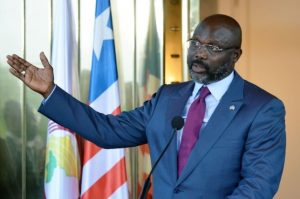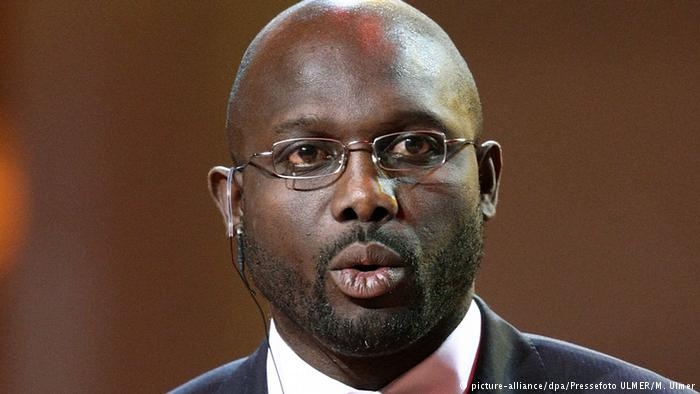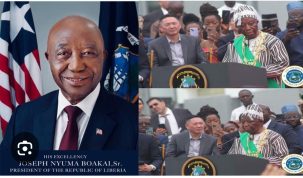Liberia’s National Budget An Instrument for National Development or National Destruction?
By
Frederick A.B. Jayweh, B.A, LL.B., LL.M., Counsellor-At-Law & International Affairs Director
Africa Center for Law and Human Rights, Inc.
To make the argument and help Liberians to fully understand and appreciate whether Liberia’s National Budget year-in-year-out enacted into law by the National Legislature of Liberia is an instrument for National Development or an instrument for National Destruction, a careful review, and an objective analysis of Liberia’s Public Finance Management Act of 2009 is imperative and mandatory. To question the appropriate and usefulness of the National Budget of Liberia, Liberians residing abroad and at home will need to review and understand the restatement of the 2009 Act and its relationship to Liberia’s National Budget and the impact of Liberia’s National Budget on the development and progress of Liberia. As we research and embark on this national effort, the Republic of Liberia is 174 years old today. And yet, Liberia’s National Budget, for most of Liberia’s national life, is employed as the instrument to undercut Liberia’s development needs with no real measure put in place to hold those responsible for Liberia’s backwardness and underdevelopment accountable. Though Liberia is today 174 years old, nonetheless, Liberia is badly underdeveloped.
National Development or an instrument for National Destruction, a careful review, and an objective analysis of Liberia’s Public Finance Management Act of 2009 is imperative and mandatory. To question the appropriate and usefulness of the National Budget of Liberia, Liberians residing abroad and at home will need to review and understand the restatement of the 2009 Act and its relationship to Liberia’s National Budget and the impact of Liberia’s National Budget on the development and progress of Liberia. As we research and embark on this national effort, the Republic of Liberia is 174 years old today. And yet, Liberia’s National Budget, for most of Liberia’s national life, is employed as the instrument to undercut Liberia’s development needs with no real measure put in place to hold those responsible for Liberia’s backwardness and underdevelopment accountable. Though Liberia is today 174 years old, nonetheless, Liberia is badly underdeveloped.
Section 1: Title, Purpose and Scope of the Act
- This Act governs all matters related to the management of the public finances of the Republic of Liberia. It lays out fundamental procedures for the preparation, adoption, execution and final accounts of the National Budget and related matters including internal control, accounting and auditing of public finances, assets as well as the arrangements for public debt and government guarantees. This Act shall be supplemented by enabling regulations promulgated by the Ministry of Finance and approved by the President to further specify the procedures in each of the areas mentioned herein, and which may be amended from time to time. The Legislature, in execution of its oversight responsibilities, shall ensure that all regulations issued pursuant to this Act are consistent with the Act.
- The provisions of this Act shall apply to all agencies, entities, and institutions of the central government. For the purposes of this Act, the central government comprises:
-
- The Executive and all its agencies/entities/institutions
- The Legislature and all its agencies/entities/institutions
- The Judiciary and all its agencies/entities/institutions
- Autonomous Public Agencies under central government control.
In addition to Section (1) and (2) (a)-(d) that defines the purpose and scope of Liberia’s Public Finance Management Act of 2009, Section 5 (1) and (2) states the role and authority of the President of Liberia when it comes to the actual management and execution of the National Budget of Liberia vis-à-vis Liberia’s Minister of Finance and Development. Whether Liberia’s National Budget is used as an instrument for national development or national destruction or not, will principally depend upon what goes into the preparation of Liberia’s National Budget and the implementation of Liberia’s National Budget for the common good of Liberia and its people. Whether Liberia’s National Budget is meant to develop Liberia and better the lives of the people of Liberia, depends largely on what appropriations are year-in-year-out allocated for the people.
In the execution of his overall duties and responsibilities to the people of Liberia, the Public Finance Management Act of 2009, Section 5 (1) and (2), empowers the President of Liberia:
- The President has overall responsibility for all policy matters related to the National Budget and public financial management system of the Republic of Liberia and has the authority to take the decisions and actions necessary to carry out such responsibilities.
- Except for the authority to submit the Proposed Budget to the Legislature, the President may delegate to the Minister, any of the authorities and powers conferred on the President under this Act subject to terms and conditions specified by the President at the time of the delegation. Such delegation, however, does not discharge the responsibility of the President regarding this Act.
Section 6: Authority and Responsibilities of the Minister
- The Minister is responsible for all technical matters related to the proper functioning of the public finance management system, subject to the overall policy guidance from the President as prescribed in Section 5.1.
- The Minister’s specific responsibilities include the preparation and execution of the National Budget, the preparation of annual and in-year accounts and other reports pertaining to the National Budget, and the management of government property, fixed assets, financial assets, including revenues, debt, and Government guarantees, as specified in this Act.
- Following approval from the President, and consistent with the laws of the Republic of Liberia, the Minister may establish, structures/units within the Ministry for implementing the requirements under this Act to fully discharge his/her functions prescribed herein. Details relating to such structures/units will be prescribed in regulations pursuant to this Act.
- Authority and responsibility specifically granted to the Minister under this Act may be delegated to deputies or other key designated officials of the Ministry. Any responsibility delegated under this subsection does not, however, divest the Minister of the responsibility under this Act.
In accordance with Liberia’s Public Finance Management Act of 2009, year-in-year-out, the President of Liberia must prepare and submit a proposed National Budget yearly to the National Legislature, (the House, and the Senate) consistent with their oversight responsibility to enact into law a National Budget to develop Liberia and better the lives of Liberians. When approved by the President of Liberia, Liberia’s National Budget, then becomes the law of the land and binding on the residents and citizens of Liberia. We intended to critically investigate and discuss whether Liberia’s National Budget enacted into law year-in-year-out is a national instrument for development or an instrument of national destruction of Liberia, its citizens, and residents. How fairly has Liberia’s National Budget impacted the overall development of Liberia?
What amounts of money are year-in-year-out allotted and set-aside for county development vis-à-vis the operation and management of the National Legislature, (the Senate and House of Representatives) of Liberia? In this paper, we will examine, scrutinize, and discuss the total amount of money allotted to the National Legislature as vis-a-vis amount of money allocated or set-aside for county development in Liberia. We will review and discuss Liberia’s National Budget from July 1, 2018, to June 30, 2021, and analytically measure its overall impact on Liberia’s national development’s needs and the betterment of the lives of the people of Liberia.
In Liberia’s National Budget for 2018, 2019, 2020, and 2021, the Government of Liberia appropriated and allocated US$200,000 each year per county to meet the development needs of each of the 15 counties of Liberia. In the same budget period 2018, 2019, 2020, and 2021, the Government of Liberia appropriated US$53,990,836; US$38,893,165; US$38,816,203; and US$44,603,304 to correspondingly meet the administrative and operational costs to run the National Legislature. The preceding allotments are notwithstanding Liberia’s population of about 5.2 million people, and the National Legislature, (the House and Senate) that consist of only 103 elected members. How responsible is the Government of Liberia to appropriate and set-aside US$12,000,000 to meet the overall development needs of the 5.2 million people residing in the 15 counties of Liberia and in the same Budget period, a total of US$176,303, 508 are appropriated to meet the administrative and operational costs of the Legislature? Republic of Liberia National Budget, Fiscal Year 2020/2021, for the Period: July 1, 2020, to June 30, 2021.
The National Budget of Liberia
In the period of 4 years, the Government appropriated US$12,000,000 vis-à-vis US$176,303,508 to cover Liberia’s county development, and legislative costs. How objective and pragmatic are these two and distinct appropriations? What compelling value do members of the House and Senate bring to Liberia’s overall development when the government callously appropriated US$12,000,000 in a period of 4 years to develop Liberia’s 15 counties when at the same time, the same Government of Liberia, appropriated US$176,303.508 to meet the costs of running the House and Senate of Liberia? What if each of Liberia’s 30 Senators were each paid US$5,000 per month or US$60,000 per year, and each of Liberia’s 73 Representatives were paid US$4,000 month or US$48,000? In total, US$60,000 per year, per Senator x 30 Senators = US$1,800,000. And US$48,000 per year, per Representative x 73 Representatives = US$3,504,000. What if US$50,000 x 30 Senators were allocated to purchase 30 vehicles for Liberia’s 30 Senators? US$50,000 per vehicle, per Senator x 30 Senators will equal US$1,500,000. And what if US$40,000 were appropriated to buy a vehicle for each of Liberia’s 73 Representatives? US$40,000 x 73 = US$2,920,000.
What if US$60,000 per Senator x 30 Senators = US$1,800,000, and US$ 50,000 per representative X 73 Representatives = US$3,650,000, were allotted and set-aside to settle what the Government seemingly designates Legislative Engagement costs set-aside for Liberia’s National Legislature?
US$15,174,000 x 4 years = US$60,696,000. In other words, in 4 years, the Liberian Government will only expend this amount of money to meet the salaries and operational needs of Liberia’s National Legislature, and not the alarming amount of US$176,303,508 allotted in Liberia’s National Budget.
And if Liberia had systematically deducted US$60,696,000 from US$176,303,508, then Liberia and its people would have had US$115,605,508 left as a significant amount to help develop Liberia.
US$115,605,508 + US$12000,000, = US$127,605,508. Overall, this huge and substantial amount of money inappropriately allotted in Liberia’s National Budget could have been left to meet Liberia’s development needs such as the building of roads to connect Liberia’s 15 counties. Instead, our government is wasteful.
Implied Consent and Collusion
Taking refuge and callously concealing themselves under Liberia’s Public Finance Management Act, Liberia’s opposition political parties and their leaders knowing fully well that when elected to national leadership in Liberia they and their officials also stand the ultimate chance to use Liberia’s National Budget as the instrument to benefit them and undercut Liberia’s national development goals and keep Liberia’s 5.2 million citizens and residents under continuous poverty, Liberia’s opposition political parties, cheerfully choose to stay mute on whether Liberia’s National Budget as is, is an instrument for national development or an instrument for national destitution. While in opposition and waiting for their term to govern Liberia, Liberia’s opposition political parties shrewdly choose to stay clear of examining and analytically discussing Liberia’s National Budget for the common good of Liberia and its people. If Liberians elected to Liberia’s Legislature, (the Senate, and House of Representatives) also keenly stand to benefit and receive US$176,303,508 instead of US$60,696,000 set-aside in the space of 4 years to meet their salaries and other professed legislative needs, why should they and their leaders dare to challenge the inequity, waste, and financial abuse appropriated year-in-year-out in Liberia’s National Budget? Liberia’s National Budget as a matter of law is a public document. If Liberia’s opposition political parties have not consented and colluded with the State to this inequity, waste, and unjust enrichment, why are they silent?
Travesty of Liberia’s National Budget
Part I: Section 2 (a) and (b) of the Public Finance Management Act of 2009, provides that all members of the Executive are accountable to the National Legislature of Liberia for the way they carry out their responsibilities with respect to the management of public finances; and within the Executive, all public officials entrusted with public finance responsibilities are accountable to the President of the Republic of Liberia for the proper execution of their duties. On an annual basis, the Act instructs that the budget authority is granted by Liberia’s National Legislature for a fiscal year, unless there are exceptions specified and granted under our Constitution or Statutory Law.
On the contrary and notwithstanding the precision and directive of Liberia’s Public Finance Management Act and its self-executing effect on those responsible to manage Liberia’s public finances, Liberia’s National Budget, is and remains, a travesty when it comes to the appropriation and execution of Liberia’s National Budget. Liberia’s National Budget has tragically and mainly been the vehicle to apportion and share Liberia’s revenues and resources for the common good of few members of the Government of Liberia; explicitly, the Legislative and Executive branch of the Government of the Republic of Liberia. By Law, Liberia’s National Budget is enacted into law to benefit Liberia’s national development initiatives and its citizens. Nevertheless, a significant and huge portion of Liberia’s National Budget is mainly allocated and used to undercut the very development needs of Liberia and its people. Why is Liberia’s Legislature, (the House and Senate) allotted US$176,303,508 and not US$60,696,000 to meet the costs to run the Legislature?
The Development of Liberia
Although Liberia’s Public Finance Management Act, Part I: Section 5 (1) and (2), mandates and instructs that the President of the Republic of Liberia is responsible to make sure that Liberia’s revenues and finances are appropriately managed; notwithstanding, Liberia’s National Budget year-in-year-out enacted into law, is mainly managed, and executed to undercut Liberia’s overall development needs and benefits just a handful of people in Liberia. To avert this travesty Liberia’s National Budget, needs to be reformed and made available to the public as provided for and contained in Part 1: Section 14 (1) and (2) of Liberia’s Public Finance Management Act. The proposed Budget submitted to Liberia’s National Legislature, needs to be immediately published in major newspapers to give Liberians adequate time to properly examine the Budget.
Today as it stands, Liberia and residents have no roads to connect its 15 counties because the National Budget of Liberia is badly written and is filled with fraud, waste and unnecessary appropriations deigned to simply share Liberia’s revenues and resources amongst a handful of officials and former officials of the Government of Liberia. Image on July 1, 2018, to June 30, 2021, the Government of Liberia appropriated and assigned US$176,303,508 to cover the administrative and operational costs to run Liberia’s National Legislature and during same budget period, the Government only allotted only US$12,000,000 to develop Liberia’s 15 counties.
If Liberia must be developed and the lives of Liberians and residents made better, Liberia’s National Budget, needs to be re-examined and reformed to benefit Liberia and our people, and not a handful of officials and former officials of the Government of Liberia. As it stands today, the National Budget of Liberia is purely the creation of waste and the abuse of Liberia and its people.
July 1, 2018, to June 30, 2021, the Government of Liberia, allocated US$441,233,732 to run Liberia’s Ministry of Finance and Development vis-à-vis US$12000,000 to develop Liberia’s 15 counties. Republic of Liberia National Budget, Fiscal Year 2020/2021, for the Period: July 1, 2020, to June 30, 2021.
To develop Liberia and better the lives of its people, Liberia’s National Budget, must be front and center of our national debate and consciousness to make Liberia better.
About the Author
FrederMr. Jayweh, is the International Affairs Director of Africa Center for Law and Human Rights and was once an 18-year resident of Colorado, United States of America. Counsellor Jayweh is a graduate of University of Denver College of Law/Strum College of Law and holds a Master of Laws (LL.M. degree). Also, Mr. Jayweh is a graduate of the Louis Arthur Grimes School of Law, University of Liberia and the African Bible College/African Bible College University. Mr. Jayweh was the Executive Director of Center for Immigrants established in the State of Colorado, United States of America. He has managed Office for Refugee Resettlement (ORR), United Nations, Colorado Foundations and Faith-based projects that amounted to more than US$1.5 Million. Mr. Jayweh has a combined experience and expertise of nearly 20 years in human rights work and management. He is also a former acting social services director at Rocky Mountain Survivors Center, (RMSC), a Colorado and United States-based refugee and torture treatment agency in Colorado, USA; Mr. Jayweh, is a member of the Supreme Court and the ECOWAS Community Court of Justice Bar Association and former Magisterial Judge at Monrovia City Court. Mr. Jayweh helped to research and to write every project. ick A.B. Jayweh, B.A, LL.B., LL.M., Counsellor-At-Law & International Affairs Director
was once an 18-year resident of Colorado, United States of America. Counsellor Jayweh is a graduate of University of Denver College of Law/Strum College of Law and holds a Master of Laws (LL.M. degree). Also, Mr. Jayweh is a graduate of the Louis Arthur Grimes School of Law, University of Liberia and the African Bible College/African Bible College University. Mr. Jayweh was the Executive Director of Center for Immigrants established in the State of Colorado, United States of America. He has managed Office for Refugee Resettlement (ORR), United Nations, Colorado Foundations and Faith-based projects that amounted to more than US$1.5 Million. Mr. Jayweh has a combined experience and expertise of nearly 20 years in human rights work and management. He is also a former acting social services director at Rocky Mountain Survivors Center, (RMSC), a Colorado and United States-based refugee and torture treatment agency in Colorado, USA; Mr. Jayweh, is a member of the Supreme Court and the ECOWAS Community Court of Justice Bar Association and former Magisterial Judge at Monrovia City Court. Mr. Jayweh helped to research and to write every project. ick A.B. Jayweh, B.A, LL.B., LL.M., Counsellor-At-Law & International Affairs Director
You can also read:





